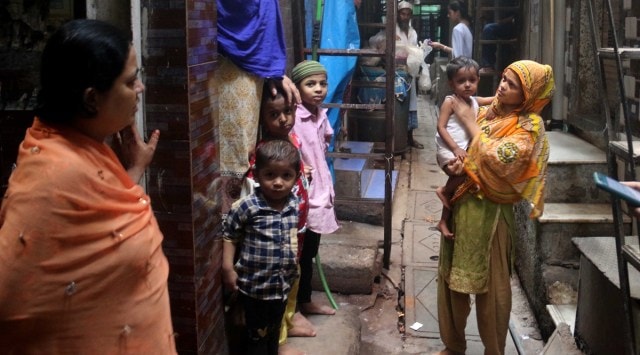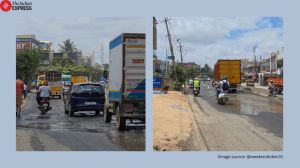Gasping For Breath
Residents of Govandi in Mumbai claim every household in the area has a member infected by TB in recent years. According to BMC data, between January and May 2022, the M/East ward, where Govandi is located, reported 2,058 TB cases. Residents blame the Deonar landfill and a bio-medical waste treatment plant in the vicinity for the high number of cases of TB and other respiratory diseases. Pratip Acharya reports
 Residents live in cramped conditions in Govandi. Picture: Deepak Joshi
Residents live in cramped conditions in Govandi. Picture: Deepak JoshiIt was in the summer of 2019 when 25-year-old Ruksar Begum, who lived in MHADA colony at Shivaji Nagar, Govandi, was infected with Pulmonary Tuberculosis (TB). After going through an episode of serious coughing and respiratory disorders, Ruksar was admitted to a local hospital for treatment. For three months, she battled the disease. In September 2019, she succumbed to TB. Little did her family knew then that two years later Ruksar’s sister Halima, also 25 years old, would meet the same fate and die of TB.
Both Ruksar and Halima are survived by their parents, Mohamed Yousuf and Zubaida, and elder brother Mohamed Gous (38). Gous says similar stories can be heard in almost every household at Shivaji Nagar, Mankhurd and Govandi, where one or more members from a single family are either infected or have been infected with TB or other respiratory diseases at some point of time.
The residents attribute their health condition to the city’s pre-Independence era dumping ground at Deonar, as well as Mumbai’s sole Bio-Medical Waste Treatment (BMWT) plant and disposal facility that was set up at Govandi 13 years back adjoining the Ghatkopar-Mankhurd Link Road (GMLR), just beside the Deonar landfill.
When The Indian Express visited the BMWT plant site, it found that the plant and the landfill are surrounded by residential clusters. The eastern boundary of the plant extends till the Deonar landfill, which was set up by the Brihanmumbai Municipal Corporation (BMC) in 1927. On the western side of the landfill lies the GMLR, adjoining the main gate, while the north and southern ends are surrounded by housing clusters, which are mainly slums.
“The dumping ground and the bio-waste plant are in close proximity to our house. Our entire neighbourhood inhales the smell of decomposed waste throughout the day. In addition, smoke emitted from the plant’s chimneys pollute the atmosphere. Residents have no choice but to inhale the pungent and toxic air, which eventually affects our lungs. Every household has reported at least one case of TB in recent years and it is because of this reason, we lost two members of our family within a span of two years,” Gous said.
The Deonar dumping ground has been a primary cause behind the health issues of the local residents since the beginning of the 21st century. With Mumbai’s changing demography, slum-dwellers started to migrate to the suburban belt during the mid-1990s. During the mid-2000s, informal housing mushroomed in the Deonar, Mankhurd and Shivaji Nagar areas, as close proximity to the landfill ensured lower living cost and became one of the major residential hubs for the Low Income Groups (LIGs).
 Govandi residents Mohamed Yousuf and Zubaida lost both their daughters to TB. Picture: Deepak Joshi
Govandi residents Mohamed Yousuf and Zubaida lost both their daughters to TB. Picture: Deepak Joshi
In 2015, the BMC in its survey marked the neighbourhood around the landfill as the most populated area of the city.
At the MHADA colony, which is 1.5 kilometres from the bio-waste plant and around 700 metres from the outer perimeter of the landfill, there are 84 residential buildings and each building has 61 flats. The buildings are separated by one lane. Each flat houses one family and there are, on an average, six to 10 members living in each flat, cramped together inside a single room. Owing to the shortage of space, many family members are compelled to sleep in the corridor at night.
These buildings were constructed back in the 2000s by the state government to provide formal housing to slum-dwellers.
Surekha Holkar, one of the residents of the colony, also works at a local NGO. Her 15-year-old grandchild, Prajakta Holkar, lost her life to TB in 2020. “Prajakta was healthy and full of life. It was during the pandemic when we had to stay indoors that she suddenly started coughing. Her health became very weak and we were petrified. We took her to the local hospital and then to D Y Patil hospital in Pune. She died soon after,” Surekha said.
She said that following her death, local volunteers of an NGO came to their house and carried out TB and asthma tests of each and every family member, but all of them tested negative.
The civic data states that between January and May 2022, a total of 2,058 TB cases were reported from the M/East ward, where the dumping ground and waste treatment facility is situated. In 2021, 5,080 TB cases were reported from this area, which was nearly 10 per cent of the 59,062 cases reported in Mumbai. In 2020, 3,768 cases were reported from this ward, which was also 10 per cent of the cases reported in the city. In 2019, 5,244 cases were reported, while in 2018, a total of 6,622 cases were reported from this place.
Another resident Umar Qureshi (56) told The Indian Express how his 15-year-old daughter Shafi fainted inside their flat during a summer afternoon this year after she developed frequent coughing.
“Our daughter developed a mild cough and fever; however, her body temperature didn’t decrease for a week and suddenly one day she fainted inside the flat. We took her to the hospital and were told that she was infected with TB. The doctors said that it’s because of the heavy pollution level that her lungs have got infected badly,” Qureshi said.
“She has been on medication since and today she insists on not taking medicines regularly because of side-effects. The monthly expenses on her medicines is around Rs 3,000, which is draining me financially as well,” Qureshi said.
The average monthly expenses on TB medicines range between Rs 2,000 and Rs 4,500, depending on the nature of infection. Since all the families belong to LIGs, the average income of a family is in the Rs 8,000-Rs 10,000 range, making it difficult for them to continue treatment.
Qureshi recalls that when her daughter was admitted, the hospital bill amounted to Rs 45,000 and he had to take a loan to clear it. “Till date I am repaying the money,” said Qureshi, a vendor.
 Mumbai’s sole bio-medical waste treatment plant and disposal facility was set up in Govandi 13 years ago. Picture: Deepak Joshi
Mumbai’s sole bio-medical waste treatment plant and disposal facility was set up in Govandi 13 years ago. Picture: Deepak Joshi
Surekha also said that the bills for her grandchild’s treatment almost touched a lakh and it became difficult for her to continue the treatment in the final days.
During its visit, The Indian Express also found that public hygiene, sewage system and water supply were in an appalling state in the area. The drainage and sewage lines were choked to the extent that floating waste could be seen entering the threshold of buildings. In the slums, most of the community toilets were defunct. Often residents defecate in open drains and roadsides, adding to the area’s pollution woes.
Residentspeak
Owing to the poor health conditions, residents have filed multiple complaints with the Maharashtra Pollution Control Board (MPCB). Local activists have been raising complaints through the MPCB’s Twitter handles and one Public Interest Litigation (PIL) was also filed by them in the Bombay High Court. A group of local residents had also filed an online complaint with the Central Pollution Control Board (CPCB), which was later forwarded to the MPCB.
The residents have also sent a notice to the environment department of both the Union and state governments, demanding immediate relocation of this plant. Between 2020 and 2022, the residents have carried out multiple Twitter campaigns with hashtags #SaveGovandi, #PollutionFreeGovandi, #CleanGovandi and #MautKaKarkhana.
In July 2022, one of the residents also wrote to President Droupadi Murmu, urging her office to look into the matter. In August 2022, members of as many as 43 NGOs held a demonstration outside the plant.
Faiyaz Alam Shaikh, a local resident, who has filed multiple complaints with the MPCB and CPCB and also filed the petition in the HC, said that the state government and the civic administration are turning a blind eye to the problem. “Govandi is always known to have high cases of TB, asthma and other pulmonary disorders. The BMC’s data shows that 8 to 10 per cent of the city’s TB cases have been reported from Govandi between 2018 and 2022. Every year, the proportion of TB cases is rising and this can be clearly attributed to the smoke emitted from the plant. There is already a dumping ground here, which is one of the primary reasons behind the poor health condition of the citizens. The bio-waste plant has added to the problem, emitting thick black smoke through its chimneys. Yet, the authorities are not taking any step,” Shaikh said.
According to IqAir, an air-quality monitoring website, the Air Quality Index (AQI) of Deonar read 205 on the day The Indian Express visited the spot. According to the AQI monitoring chart, readings between 200-300 are considered ‘poor’. It is pertinent to note that AQI is determined by the presence of PM 2.5 constituents in the air, which mainly consist of dust particles and particulate matter emitted from emission and burnt residues.
Civic officials, who are monitoring the AQI of Govandi along with System of Air Quality and Research (SAFAR), said the area records ‘poor’ AQI throughout the year due to landfill particles.
Mohamed Sagir Ansari, a local resident and president of Social Education and Valuable Association (SEVA), a non-profit body that mainly operates in the health and education sector, blamed the bio-medical plant for the deteriorating air quality of the area, which has led to the sudden rise in lung disorders. Ansari also said people in these areas were not affected by Covid-19 pandemic, as much as they are affected by the air pollution now.
“The cases of TB are so high in this area that whenever a patient visits a doctor, the medical authorities recommend a TB test first compulsorily. There is already an existing problem of malnutrition in this part of the city and now with the poor air quality even children and teenagers are suffering from lung diseases. At times, the intensity of smoke emitted from the plant becomes so thick that one can feel a burning sensation in the eyes and nose. Almost all the residents living here come from low income groups and they can’t afford air purifiers,” said Ansari.
Local self-help groups have started delivering groceries and necessities at the doorsteps of patients whenever there is a case of TB in the area. “In every household, from which cases of TB are reported, we supply 10 kg of rice, lentils and wheat on a monthly basis for free. We also carry out doorstep delivery of fruits and monitor the situation of the patients and keep the medical authorities posted about their health,” said Laxmi Pillai, who runs a self-help group.
She also said that this year, the number of TB cases reported from Shivaji Nagar is 76 and the actual numbers could be much more.
Dr Zahid Khan, a local physician, said on an average 12 to 15 cases of TB are reported from Deonar and Govandi alone. However, he didn’t attribute the reason to the bio-waste plant directly. “TB is caused by bacteria, so the main causes are the pollution level and infections caused by living near the landfill. There are cases of asthma and conjunctivitis as well that are often reported from these places, which could be attributed to the air quality. The primary cause of these diseases are poor hygiene and lack of basic necessities including sanitation and nutrition. Malnutrition is also another reason that harms the immunity of children and reduces life expectancy here,” Khan said.
“Since people live in such conditions, often the infections rebound. There have been multiple cases when a patient who recovered from pulmonary TB was again infected with abdominal TB. These cases are frequent occurrences over here,” Khan said.
Expertspeak
Amita Bhide, DEAN of School of Habitat Studies, Centre of Environment Health, Tata Institute of Social Sciences (TISS), said there are several factors in Shivaji Nagar, Mankhurd and Govandi affecting the health of residents.
“There is no doubt that the entire Shivaji Nagar, Deonar and Govandi areas have multiple environmental hazards. The location of setting up this bio-waste processing incinerator could have been chosen based on the logic that this place already has a dumping ground. Therefore, the logic of convenience of the authorities directly contradicts the justice of the people living there. This situation is now directly affecting the citizens including the vulnerable groups who don’t have any other option but to continue to stay here, considering housing is severely expensive in Mumbai,” Amita told The Indian Express.
Also, a TISS report published earlier on the socio-economic conditions and vulnerabilities of M/East ward (where the dumping ground is situated) notes high incidences of malnutrition, respiratory issues and diseases like TB among the locals.
Amita added that shifting the plant to another space will not bring an end to the issue and the administration needs to bring out decentralised methodologies for tackling such issues. “If this plant is being shifted to another location, the locals residing there may start facing these issues. Therefore, the only way to mitigate this problem is by taking a decentralised approach. If there would have been one dumping ground and waste processing incinerator in every municipal ward, then the hazardous pollution emitted from Deonar alone would have been much lesser,” she added. Amita said that diseases like TB are not caused by air pollution alone and there are other factors involved as well.
“Also, diseases like TB happen not just because of external factors but many internal factors play their part as well. The residents live in a tight claustrophobic house which doesn’t have proper ventilation. The children are also malnourished which affects their immunity. These factors, when combined together, become the ultimate causes behind the health hazards of the citizens,” she said.
The bio-medical plant
The plant is operated by SMS Envoclean Private Limited. The contract was awarded by the BMC and Maharashtra Pollution Control Board (MPCB) in 2009. Civic officials said that initially the idea was to create three such plants for the city, one each for the island city, eastern and western suburbs.
Last year, then state Environment Minister Aaditya Thackeray had ordered relocation of this plant to Khalapur. However, it has been postponed till June 2023 pending environment clearance. “Since the two plants didn’t see the light of day due to unavailability of adequate space, all the waste was sent to this facility for treatment,” said a civic official requesting anonymity.
Amit Nilawar, director of the plant, told The Indian Express that the local residents have a prejudiced perception as they see smoke is being discharged from the chimneys. “This is a planned approach to shift us from this site. All our equipment has been tested before installing and quality control is done regularly. Just because smoke is coming out of the chimneys, the locals have been made to believe that we are discharging toxins in the air. Till date many people have said many things about our plant, but nobody has come up with any evidence or data directly linking their health hazards to our plant,” he said. “We are already in the process of shifting our plant to Khalapur and we are expecting to move out from this place. However, the process may take a few more months as it will require shifting of all the logistics from this facility which is a big task,” he said.
What authorities are doing
Civic officials said they have held multiple discussions with the management of the plant and are monitoring the situation closely. “Earlier, the HC maintained that having a treatment facility for biological waste is also important because if this particular category of waste is not being disposed of, then it will increase the overall volume of the city’s solid waste,” said Mahendra Ubale, assistant municipal commissioner. “The state government has already asked the management to relocate the plant at Khalapur. For the time being we have set up an air quality monitoring system to keep a check on the toxicity of air,” said Ubale.
A senior official, who is monitoring the AQI along with SAFAR, said, “The AQI in Deonar mainly stays in the ‘poor’ category throughout the year because of the landfill and the fact that it is not close to the sea, due to which the wind speed is slow and the particulate matter remain suspended in air for longer hours. However, during the monsoon, the AQI slightly improves due to higher wind speed. But it is between November and January when this place records the worst AQI compared to other parts of the city.”
MPCB officials said they are monitoring the emission of the bio-waste plant closely. “We have directed them to send 50 per cent of the waste to a facility in Taloja. Earlier this year, a team of BMC officials had also carried out a visit to the facility following the multiple complaints that were filed by the locals. They had recommended certain operational changes to which the facility has complied. We are monitoring the situation closely,” said an official.







